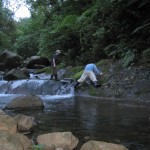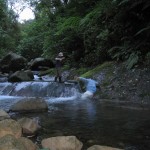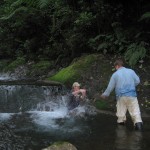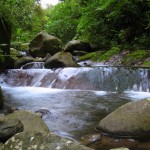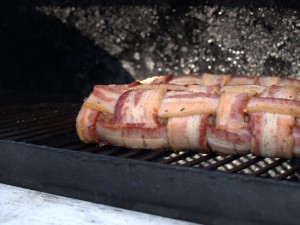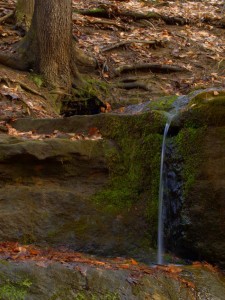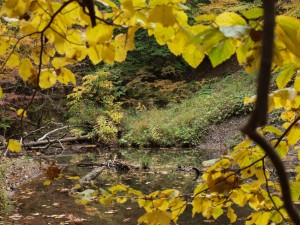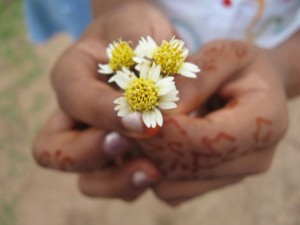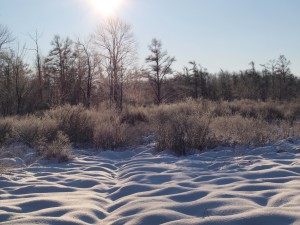Soon, I’ll be experiencing this tropical, premontane, river surrounded by wet forest with the folks in the sequence of photographs below: Mike and Erin. We may be more prepared for a hike through the river this time though….
Monthly Archives: March 2009
Alberto Manuel Brenes Biological Reserve
I will be staying in a field station at the Alberto Manuel Brenes Biological Reserve outside of San Ramon, Costa Rica for nearly two weeks. There are several activities planned for our stay here, including (1) research on litter transport and retention in streams and (2) finding cool amphibians and reptiles. The pictures posted here were taken within the field station. The entrance is shown on the left, and a view of some clouds rolling through the rain forest from the ‘gallery’ is on the right.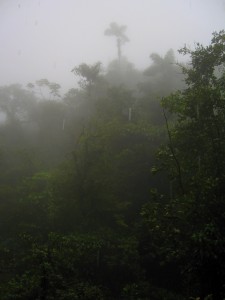
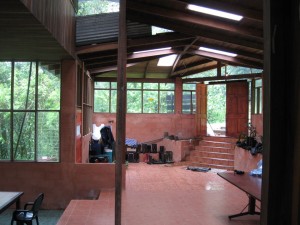
Monstrego
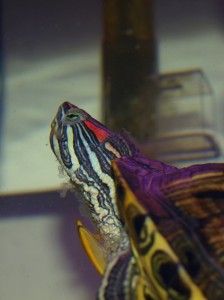 Monstrego, my male red ear slider (Trachemys scripta elegans), comes up to breath in his 55-g tank. Monstrego and Barzini are currently in the same tank, and Monstrego is constantly courting Barzini, although I haven’t seen him successfully breed this year. Barzini has laid three clutches that I’m aware of, none of which had any hatchlings emerge. Luckily though, these turtles can live upwards of 30 years if well cared for, and both of mine are about six. I’ll get a hatchling one of these times…
Monstrego, my male red ear slider (Trachemys scripta elegans), comes up to breath in his 55-g tank. Monstrego and Barzini are currently in the same tank, and Monstrego is constantly courting Barzini, although I haven’t seen him successfully breed this year. Barzini has laid three clutches that I’m aware of, none of which had any hatchlings emerge. Luckily though, these turtles can live upwards of 30 years if well cared for, and both of mine are about six. I’ll get a hatchling one of these times…
Meatstock ’09
Indian Spring
Witch-hazel frame
This may not be the best use of a natural frame for a photograph, but I’ve seen several natural frames in photographs across the Internet and think it’s a cool technique. Last fall, I took this picture near ‘deep pool 3’ at Jennings Woods (many of the stream habitats are designated for research purposes).
Disseration data
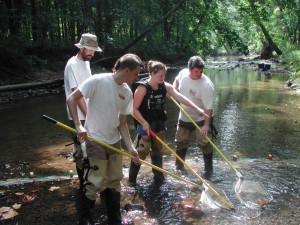 As Jenn finishes writing her dissertation, I recall assisting in data collection. Here, we were collecting tagged crayfish several weeks after a major flooding event in the stream. Although the quality of the photograph is somewhat lacking, this is one of the few we have of actual crayfish collection.
As Jenn finishes writing her dissertation, I recall assisting in data collection. Here, we were collecting tagged crayfish several weeks after a major flooding event in the stream. Although the quality of the photograph is somewhat lacking, this is one of the few we have of actual crayfish collection.
Monfredi V. Arenal
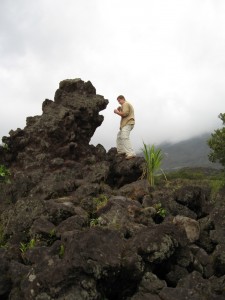 Mike battles a chunk of volcanic rock on the Arenal volcano in Costa Rica. With this kind of attitude, I cannot be sure whether doing research with him in a remote, rainforest location is safe: either Mike is reckless and, therefore, dangerous, or he is a tough, hardworking researcher not afraid to face difficult challenges head on.
Mike battles a chunk of volcanic rock on the Arenal volcano in Costa Rica. With this kind of attitude, I cannot be sure whether doing research with him in a remote, rainforest location is safe: either Mike is reckless and, therefore, dangerous, or he is a tough, hardworking researcher not afraid to face difficult challenges head on.
Henna and a flower, but not the flower Henna
On a walk with Chandana (Raja’s niece) and her cousin in India, I was forcfully told to take pictures of flowers the girls were picking. I say ‘forcfully’ because the girls were telling me to take photos of various objects because they wanted to see the photographic output, which, to them, was somehow better than the real thing.
Fading winter
The landscape pictured here is covered with a field of Virginia chain fern during the summer months, and, although some may think it’s depressing to see them covered with cold, white snow, I am sad to see that this area currently lacks snow. The winter in Ohio is moving fast and we’re already experiencing the wild temperature fluctuations associated with spring. Although we may receive a couple of major snow falls before summer arrives, they will likely melt quickly, leaving behind a depressing landscape of brown, salt-covered, mud.

